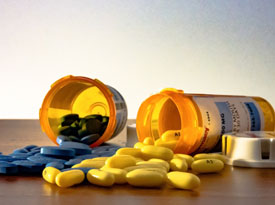Philadelphia Product Liability Lawyers: Pharmaceutical Companies Putting Patients at Risk Through Off-Label Marketing
March 3, 2017 The pharmaceutical industry has been promoting the use of medications to doctors for a variety of “off-label” reasons. “Off-label” refers to uses that have not yet been approved or tested by the U.S. Food and Drug Administration (FDA). This information should be shocking to people who take medications across the United States. Big Pharma is using the First Amendment as a defense of its dangerous, potentially fatal, marketing behavior.
The pharmaceutical industry has been promoting the use of medications to doctors for a variety of “off-label” reasons. “Off-label” refers to uses that have not yet been approved or tested by the U.S. Food and Drug Administration (FDA). This information should be shocking to people who take medications across the United States. Big Pharma is using the First Amendment as a defense of its dangerous, potentially fatal, marketing behavior.
The pharmaceutical industry seems to believe that freedom of speech should protect it from marketing untested and unapproved medication uses, and is now encouraging the FDA to adopt this perspective. If the FDA were to change this policy, the wellbeing and physical health of patients would be at serious risk. There have already been instances of people getting ill or even dying because of illegal off-label marketing.
Members of Public Citizen, a nonprofit group that works to protect the rights of consumers through advocacy efforts, have not only spoken against the policy change but have testified against it as well. One of Public Citizen’s senior advisers has said that if the FDA fails to prohibit this off-label marketing ploy that patients will be left vulnerable to innumerable harms and dangers.
There is a rigorous and comprehensive approval system in place for medications before they are put on the market. To get a drug approved, pharmaceutical manufacturers have to submit proof that a medication is safe and effective for treating the prescribed use. The pharmaceutical industry is hoping to change this policy so that it will be allowed to explicitly sell doctors medicines for their off-label uses. In simple terms, the industry is hoping to make a lot more money, regardless of the risk and consequences to consumers.
The FDA is actually considering these policy changes. But, evidence shows that off-label, unapproved medication use is incredibly risky and can cause death. When a medicine is prescribed for an unapproved use, the chance of side effects goes up by 50%. Furthermore, more than three-quarters of all unapproved uses are completely, empirically unproven. This means that that over 75% of the time that medicine is prescribed for an off-label use, it is without any proof that it works, will not be harmful and therefore could even help at all.
Representatives from Public Citizen highlight how if the FDA approves this policy change, the purpose of regulating new medications will become moot. If drugs do not need to undergo rigorous testing before being approved and their safety proven, how can medical patients be sure they are being treated in a way that will not compromise their health?
In recent years, numerous pharmaceutical manufacturers have paid large financial settlements for the illegal promotion of drugs. In 2010, Allergan Inc. paid a $600 million settlement for marketing Botox as a headache, cerebral palsy and general pain treatment, although its approved use was solely for the removal of wrinkles in adults.
And what about the lethal consequences of these illegal actions? In 2008, an 11-year-old girl died from a heart attack because she was prescribed a drug called Geodon. The drug had not been approved for use in children for that exact reason, but it was marketed as effective for treating bipolar disorder and schizophrenia in kids anyway. The 11-year-old was given Geodon for behavioral control, and just hours afterward, she died due to a fatal heart attack. Shockingly, even after the child’s death Pfizer, the manufacturer of the drug, continued to make money from it being prescribed off-label. Eventually, Pfizer paid a $330 million settlement, but no amount of compensation takes back the loss of such a young life and all from something that should never have happened in the first place.
Pharmaceutical manufacturers are too often financially driven, valuing money over consumer’s health. They have also proposed using journal articles as substantiated proof for off-label uses, yet studies show that journal articles can be fraudulent and flawed. This is because at times, Big Pharma has paid “experts” to write the articles. The FDA has the authority to restrict the ways that products are used, and since it is an agency that is meant to protect Americans, these regulations need to stay in place to prevent off-label marketing from hurting consumers. With support from Public Citizen and consumers across the country, hopefully pharmaceutical companies will not only be held accountable for past mistakes, but will be barred from continuing to make them in the future.
Philadelphia Product Liability Lawyers at Galfand Berger, LLP Advocate for Victims of Pharmaceutical Off-Label Marketing
The Philadelphia product liability lawyers at Galfand Berger have successfully represented clients in an array of legal matters. If you have any questions or concerns, an attorney at Galfand Berger, LLP can help. With offices located in Philadelphia, Reading and Bethlehem, we serve clients throughout Pennsylvania and New Jersey. To schedule a consultation, call us at 800-222-8792 or complete our online contact form.
 Google Screened
Google Screened
